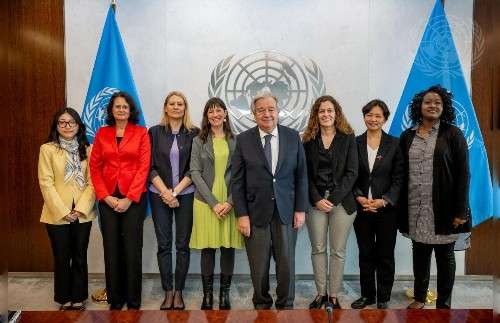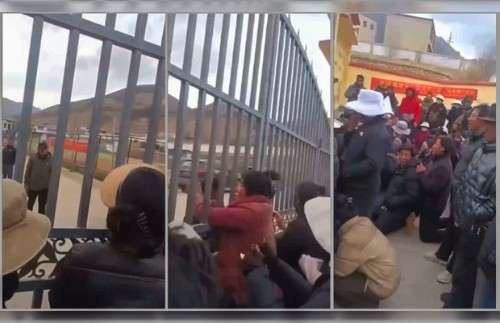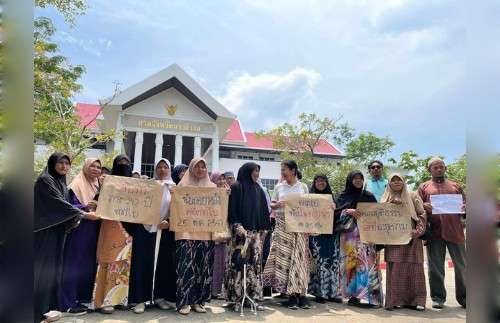
Amelia Pang is an award-winning investigative journalist of mixed Chinese and Uyghur descent who was born and raised in the U.S. Although her maternal grandmother was raised according to Uyghur traditions in the capital of northwest China’s Xinjiang Uyghur Autonomous Region (XUAR), her mother learned little of her Uyghur heritage or language due to forced assimilation policies that promoted Mandarin Chinese education and the study of majority Han Chinese culture. Pang said it was only after becoming aware of rights abuses in the XUAR—where authorities are believed to have held up to 1.8 million Uyghurs and other Muslim minorities in a network of internment camps since 2017—that she made an effort to educate herself about her ancestral language and culture.
As part of her investigation into the situation in the XUAR, which Washington last month officially designated as a form of genocide, Pang learned that amid increasing international scrutiny, authorities in the region have begun to send detainees to work at factories as part of an effort to label internment camps “vocational centers,” although those held in the facilities regularly toil under forced or coerced labor conditions. Her research into the issue led to a book, entitled “Made In China: A Prisoner, An SOS Letter, And The Hidden Cost Of America’s Cheap Goods,” in which Pang details how many of the products we use on a daily basis were likely made by enslaved Uyghur workers.
She recently spoke with RFA’s Uyghur Service about the rights violations in the XUAR that have prompted widespread condemnation of Beijing’s policies in the region that Uyghurs refer to by their preferred name of East Turkestan, and how to hold China accountable.
RFA: From your point of view, why do you think China is committing genocide against the Uyghurs?
Pang: I think it is to protect trade … The Uyghurs have always lived oppressed lives in China. But really, when you see the development of the [international infrastructure investment project] Belt and Road Initiative at certain key points, you see a spike. For example, in 2017, China invested U.S. $66 billion in the building infrastructure in Xinjiang or East Turkestan for the Belt and Road Initiative, because that region is of huge logistical importance to China. It’s a transportation hub that connects China to the Middle East, to West Asia, and to Europe. It’s hugely important trade routes there that go through East Turkestan. And the Chinese government is very afraid that this group of oppressed people might be interested in starting an uprising in the future and could potentially endanger their trade investments.
Of course, we don’t really see a lot of evidence that any kind of uprising would happen because it is just, I think, that most of the Uyghurs just want to live a decent life and not be in prison at this point. They are not going to engage in anything to upset the Chinese government. So, they just want to be freed and have decent access to jobs and education and things like that. But, you know, you see that since the crackdown on the Uyghurs is so closely tied to the Belt and Road Initiative investments, we can pretty safely say that trade is what started this.
So, if trade is what started this, then there’s things we can do about it to try to help the Uyghurs. If we take trade away from China, then that could be a really powerful tool to compel the Chinese government to revisit its policies towards speakers. So, things like … [U.S. sanctions in December] banning all products made by the [key paramilitary group] bingtuan in Xinjiang is really important. That was a significant legislation because it was really one of the first legislations that really banned a larger [group] of products from China instead of one single type of product from a single company, because that’s not really effective … And what would really be more effective is the passing of the Uyghur Forced Labor Prevention Act [reintroduced this week to the U.S. House of Representatives], because that would be a huge loss of money to the Chinese government if all products from China could no longer be exported to the U.S. and money talks—that could be a significant tool to push China to release the Uyghurs.
Changing consumer habits
RFA: Other than that, what do you think the American people can do to pressure China to stop the genocide?
Pang: During my research I found that a lot of times the reason why Chinese factories used Uyghur forced labor, the reason why they might subcontract to Uyghur forced labor, for example, is actually intricately connected to Western consumers like us and the way that we buy products. For example, we tend to support companies that can offer the lowest prices for the latest trends. We see a lot of us like to buy the latest fashion trend, for example, or the trendy product—whatever is new, newly produced. What happens is that a lot of corporations are really compelled to shorten the production deadline for products more and more and more over the years to the point where has reached a really unsustainable rate.
That is the factor that contributes to making it lucrative for these factories to use forced labor. So, if we maybe start to see a cultural change among consumers where we stop chasing the latest trends for the cheapest prices, we can really remove some of the factors that really compel factories to use forced labor.
RFA: But American consumers are so used to cheap products made in China and pretty much everything, everything is made in China. American consumers have a huge dependency on cheap products made there. So how likely is it that the average American will consume more conscientiously?
Pang: That is a terrific point. And yes, everything is made in China and there are a lot of things that are only made in China, and even if it says it’s made in the USA, the raw materials could be made in a labor camp in China, as you’re seeing with the raw materials for solar panels that are being made in a Uyghur labor camps.
I think it’s not necessarily avoiding all “Made in China” products that can be an effective form of protest because it’s very overwhelming, like you said, for a lot of Americans to actually do that, maybe even impossible for most people to do that, including even ones that are wealthy and can afford to pay higher prices. So, one way we can address this is to start pushing corporations to be more transparent about where they’re actually sourcing from, because not every Chinese factory is necessarily bad or using Uyghur forced labor per se. I’ve heard that there are so many Chinese factories, they’re all very competitive with each other. They all really want a contract with a big global brand like our American companies. And if they can get it, they don’t want to do anything to upset that company. And if that company says very seriously, “we don’t want you to use forced labor,” then they can follow instructions, if that’s what it takes to keep that contract. But they have to know that the company cares about it, and right now our corporations are not sending that message to the labor camps.
Psychologists have studied and found that, yes, consumers do like cheap prices. We feel immense joy when we can find a big, big bargain sale. But there’s a certain threshold that if the information we learn about how this product is made is so disturbing, once it crosses that threshold in terms of how disturbed we are by that news, the price no longer matters. Our desire for that product no longer matters. We are human beings who do don’t want to engage in the suffering of others. So, if we could really effectively promote the message that, hey, there are certain brands that there’s hard evidence that they are, you know, partaking in literal genocide … If you’re not OK with that then you can find a different product to use.
Maybe we can’t do this to every company that is using Uyghur forced labor, but if we could get enough of this momentum going, it can create a fear among a lot of corporations to the point where they will start taking this issue a lot more seriously.
Reported by Alim Seytoff for RFA’s Uyghur Service. Written in English by Joshua Lipes.
Copyright © 1998-2020, RFA. Used with the permission of Radio Free Asia, 2025 M St. NW, Suite 300, Washington DC 20036. https://www.rfa.org
Report Warns,Climate Change Set to Cut Average Income by 19%
Timor-Leste Seeks Economic Lifeline as Oil Wealth Dwindles
South Africa Prepares to End Lion Hunting in Captivity
UN Secretary-General Meets with Working Group on Discrimination Against Women and Girls
On Both US Coasts,Pro Palestinian Encampment Protesters Hold Ground
Philippine Police Arrest 3 Suspects Over On-Air Killing of Broadcaster
In Tibet, Parents Plead for Children to Help Collect Caterpillar Fungus
Vietnamese Monk Seeks Justice for Brother Who Died after Police Interrogation
Subscribe Our You Tube Channel
Fighting Fake News
Fighting Lies
















